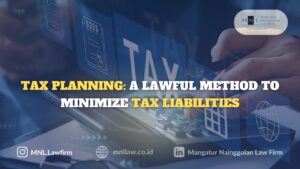
TAX PLANNING: A LAWFUL METHOD TO MINIMIZE TAX LIABILITIES
In the commercial sphere, business entities invariably pursue maximum returns with minimal sacrifice. Such sacrifice represents a cost component that must be expended. One of the more substantial cost components is the obligation to discharge tax liabilities. However, these liabilities may be lawfully reduced minimized by legal means without contravening statutory mandates. The proper mechanism for doing so is through Tax Planning, namely the deliberate and strategic arrangement of financial affairs designed to mitigate the impact of taxation within the confines of the law.
What is Tax Planning?
Tax Planning is financial planning that includes organizing, calculating, and determining strategies to minimize tax burdens in accordance with legal provisions. This definition is in line with the opinion of Chairil Anwar Pohan, who defines tax planning as the process of organizing a taxpayer’s business in such a way that their tax liabilities, both income tax and other taxes, are kept to a minimum, provided that this does not violate applicable laws and regulations.
Business Tax Obligations
In general, every business that offers goods and services has an obligation to pay Income Tax (PPh) and Value Added Tax (PPN). Certain goods are subject to excise tax. In addition, there are also several local tax obligations. Further details are as follows:
-
-
- Income Tax is Income Tax (PPh)
-
Income Tax is regulated under Law No. 36 of 2008 on Income Tax (“PPh Law”) in conjunction with Law No. 7 of 2021 on Harmonization of Tax Regulations (“HPP Law”). Theoretically, PPh arises due to the generation of income. The imposition of PPh is based on the taxpayer’s circumstances. If the taxpayer has income, the taxpayer is required to pay PPh; conversely, if the taxpayer has no income, the taxpayer is subject to zero PPh.
Legally, the PPh Law categorizes PPh based on the type of income and its taxation, including: PPh 21/26 on personal remuneration, PPh 23/26 on services, rentals, and corporate compensation, PPh 4(2) on rentals, dividends, and other income, PPh 25 on tax installments, PPh 22 on specific objects and parties, PPh 24 on foreign loans, PPh 15 on certain industries;
-
-
- Value Added Tax (VAT)
-
Value Added Tax is regulated by Law Number 42 of 2009 concerning Value Added Tax in conjunction with Law Number 7 of 2021 concerning Harmonization of Tax Regulations (“HPP Law”). Theoretically, VAT is a tax imposed on the added value of a taxable object, namely Taxable Goods (BKP) or Taxable Services (JKP). VAT can only be managed by Taxable Entrepreneurs from companies or individuals who are already PKP.
-
-
- Local Taxes and Customs Duties
-
Local taxes are mandatory contributions to the local government owed by individuals or entities that are enforceable by law, without receiving direct compensation, and are used for the benefit of the local government for the greatest prosperity of the people. Meanwhile, Excise is regulated in Law Number 11 of 1995 concerning Excise. Excise is defined as a state levy imposed on certain goods that have the nature or characteristics specified in this law.
Approaches and Stages of Tax Planning
Good tax planning is tax planning that does not violate tax regulations, is commercially reasonable, and is supported by adequate supporting evidence. Good tax planning begins with the following stages:
-
-
- Conducting a financial activity analysis to understand business transaction flows and their impact on tax obligations;
- Determining tax implementation options by exploring various legal strategies to minimize tax burdens;
- Consistently implementing tax compliance every month and conducting periodic reviews to ensure compliance with tax regulations;
- Conducting regular tax reviews, both quarterly and annually, to assess the effectiveness of the tax strategies that have been implemented; and
- Conducting evaluations and improvements if obstacles are encountered or regulatory changes occur, given that tax regulations are constantly evolving and can impact company strategies.
-
Conclusion
Tax planning is a plan that includes arrangements, calculations, and strategies to minimize the tax burden of a business while still referring to reasonable, adequate supporting evidence and complying with the provisions of laws and regulations.
Legal Basis
Law No. 7 of 2021 on Harmonization of Tax Regulations
Law No. 36 of 2008 on Income Tax
Law No. 42 of 2009 on Value-Added Tax
Law No. 11 of 1995 on Excise Tax
Author:
Muhammad Arief Ramadhan, S.H.
Dina Normanza Sibagariang
Editor:
Muhammad Arief Ramadhan, S.H.
